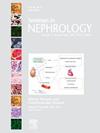因子 XI 抑制剂:在终末期肾病中的潜在作用。
IF 2.8
3区 医学
Q2 UROLOGY & NEPHROLOGY
引用次数: 0
摘要
终末期肾病(ESKD)患者的血栓风险很高,但出血风险也在增加。接受血液透析的终末期肾病患者对更安全的抗血栓治疗的需求尚未得到满足。因子 XI(FXI)是一个极具吸引力的抗凝治疗靶点,因为它有可能减轻与目前批准的抗凝药物相关的出血风险,尤其是对出血风险较高的患者而言。在血液暴露于人工表面(包括血液透析过程中的体外循环)而激活凝血的情况下,抑制 FXI 也是一种有吸引力的选择。针对 FXI 的疗法已进入临床开发的最后期阶段,包括反义寡核苷酸、单克隆抗体和合成小分子药物,这些药物可降低 FXI 水平或阻断其生理效应。这篇综述文章介绍了 FXI 抑制剂的最新药理学数据,简要介绍了这些药物的 2 期和 3 期临床试验,并对 FXI 抑制剂未来在 ESKD 患者体外循环抗凝中的潜在用途进行了批判性研究。此外,还简要讨论了 FXI 抑制剂的实验室监测和逆转。本文章由计算机程序翻译,如有差异,请以英文原文为准。
Factor XI Inhibitors: Potential Role in End-Stage Kidney Disease
Patients with end-stage kidney disease (ESKD) experience a high thrombotic risk but are also at increased risk of bleeding. There is an unmet need for safer antithrombotic therapy in patients with ESKD on hemodialysis. Factor XI (FXI) represents an attractive therapeutic target for anticoagulation because of the potential to mitigate the bleeding risks associated with currently approved anticoagulants, especially in patients at high risk of bleeding. FXI inhibition is also an attractive option in settings where coagulation is activated by exposure of the blood to artificial surfaces, including the extracorporeal circuit during hemodialysis. Therapies targeting FXI that are in the most advanced stages of clinical development include antisense oligonucleotides, monoclonal antibodies, and synthetic small molecules, which serve either to lower FXI levels or block its physiological effects. This review article presents the most recent pharmacological data with FXI inhibitors, briefly describes phase 2 and 3 clinical trials with these agents, and critically examines the potential future use of FXI inhibitors for extracorporeal circuit anticoagulation in patients with ESKD. In addition, laboratory monitoring and reversal of FXI inhibitors are briefly discussed.
求助全文
通过发布文献求助,成功后即可免费获取论文全文。
去求助
来源期刊

Seminars in nephrology
医学-泌尿学与肾脏学
CiteScore
5.60
自引率
0.00%
发文量
27
审稿时长
6-12 weeks
期刊介绍:
Seminars in Nephrology is a timely source for the publication of new concepts and research findings relevant to the clinical practice of nephrology. Each issue is an organized compendium of practical information that serves as a lasting reference for nephrologists, internists and physicians in training.
 求助内容:
求助内容: 应助结果提醒方式:
应助结果提醒方式:


